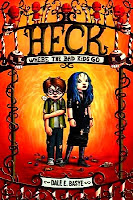 Conn is a pickpocket in the seedy Twilight area of a medieval-ish kingdome. He tries to steal the locus magicalicus of Nevery, a wizard who has been banished because of a mishap unvolving the palace and some pyrotechnics. When Conn does not die after touching Nevery's talisman, Nevery takes him on as an apprentice.
Conn is a pickpocket in the seedy Twilight area of a medieval-ish kingdome. He tries to steal the locus magicalicus of Nevery, a wizard who has been banished because of a mishap unvolving the palace and some pyrotechnics. When Conn does not die after touching Nevery's talisman, Nevery takes him on as an apprentice.Not only does Conn exhibit unusual magical abilities, he is inquisitive and saucy, and it soon becomes clear that he will help Nevery find out why magic is leaking out of the kingdom. He befriends Rowan, the daughter of the duchess, learns to read, eats lots of biscuits, and ends up saving the day.
This is the first book of a projected series. At first I was reluctant to read it, but it did have a certain charm, even if it was somewhat derivative of any number of medieval-ish fantasy books. Yes, there is even a map in the front. Even though Ms. Prineas has far more to do with college academia than I would like, it is evident that she did test this book on her own children. Will buy.
Website: http://www.magicthief.com/
Website: http://www.magicthief.com/
 As much as Heck:Where the Bad Kids Go would probably be popular with my students because of the cover, it was far too cloying and repetitive for me to take, especially since there is a sequel in the works. It might be good for fans of Lemony Snicket, and if I have an overabundance of money at some point, I might get it, but for now I'll pass.
As much as Heck:Where the Bad Kids Go would probably be popular with my students because of the cover, it was far too cloying and repetitive for me to take, especially since there is a sequel in the works. It might be good for fans of Lemony Snicket, and if I have an overabundance of money at some point, I might get it, but for now I'll pass.A student loaned me her library copy of Glass' The Year the Gypsies Came, which I thought showed a lot of trust (although I had to admonish her that this was a bad practice!), but it would have limited appeal in my library. Interesting setting; if you need anything set in South Africa, this would be the book. (From publisher's description: In Johannesburg, South Africa, in the late 1960s, twelve-year-old Emily, who longs for affection from her quarreling parents, finds comfort in the stories of a Zulu servant and in her friendship with a young houseguest who has an equally troubled family. )
Cameron's Someday This Pain Will Be Useful to You almost disappeared with my 9th grader, but when she read the review on the back she queried "Does 'existential' mean 'introspective navel gazing' ?" Well, yeah. More of a high school book. Middle schoolers are much more interested in action than thought. That's why my copy of Zindel's The Amazing Death-defying Diary of Eugene Digman is gathering dust. From the publisher's description: Eighteen-year-old James Sveck copes with the uncertainties of adolescence as he works in his mother's Manhattan art gallery, falls for a charming older gentleman, and tries to decide what he wants out of life.

 Jennifer Lynn Barnes' The Squad: Perfect Cover was a good, light weekend read. Computer hacker/semi-Goth girl Toby gets recruited to become a varsity cheerleader and international spy. The spy part is fine, the cheerleader part takes some doing, especially the makeover, which includes sparkly pink tops that do not go with Toby's combat boots. For fans of Carter's I'd Tell You I Love You, But Then I'd Have to Kill You, this will be a welcome book. I have the sequel to read tonight.
Jennifer Lynn Barnes' The Squad: Perfect Cover was a good, light weekend read. Computer hacker/semi-Goth girl Toby gets recruited to become a varsity cheerleader and international spy. The spy part is fine, the cheerleader part takes some doing, especially the makeover, which includes sparkly pink tops that do not go with Toby's combat boots. For fans of Carter's I'd Tell You I Love You, But Then I'd Have to Kill You, this will be a welcome book. I have the sequel to read tonight.


 Caleb's a slacker and proud of it-- that is, until his girlfriend decides he is a liability in her attempt to gain class presidency. In order to "improve" him, Vicky insists he go to a meeting to discuss a new self-help book, The Rule of Won. Based on the premise that positive thinking can make everything one might want come true, the book has spawned "craves" where people help each other think positively. Led by Ethan, a polished but disturbed boy, Caleb's school's crave tries to better the school-- wishing for funding to repair the gym, and hoping that the sad basketball team (named the "basket Cases"!) wins a game. These two things are accomplished by chanting, posting thoughts on a web site, and just perhaps by some questionable intervention.
Caleb's a slacker and proud of it-- that is, until his girlfriend decides he is a liability in her attempt to gain class presidency. In order to "improve" him, Vicky insists he go to a meeting to discuss a new self-help book, The Rule of Won. Based on the premise that positive thinking can make everything one might want come true, the book has spawned "craves" where people help each other think positively. Led by Ethan, a polished but disturbed boy, Caleb's school's crave tries to better the school-- wishing for funding to repair the gym, and hoping that the sad basketball team (named the "basket Cases"!) wins a game. These two things are accomplished by chanting, posting thoughts on a web site, and just perhaps by some questionable intervention.











 Still working through the dreaded Permabound order, but had two nice surprises. The first was Marianne Mitchell's Finding Zola, which was a well-paced and understandable mystery. It took me several days to read it, because I was busy, and I was able to keep the story straight, which is something the students find difficult in mysteries. There were many additional features which made the book fun-- a southwest setting with Hispanic characters and some Spanish phrases, a community of older folks, and the best treatment of a wheelchair bound character that I've seen in a long time.
Still working through the dreaded Permabound order, but had two nice surprises. The first was Marianne Mitchell's Finding Zola, which was a well-paced and understandable mystery. It took me several days to read it, because I was busy, and I was able to keep the story straight, which is something the students find difficult in mysteries. There were many additional features which made the book fun-- a southwest setting with Hispanic characters and some Spanish phrases, a community of older folks, and the best treatment of a wheelchair bound character that I've seen in a long time.































